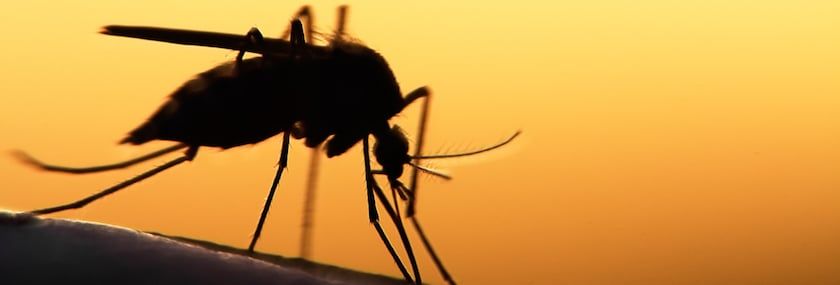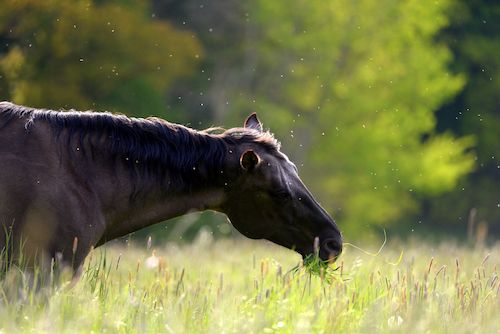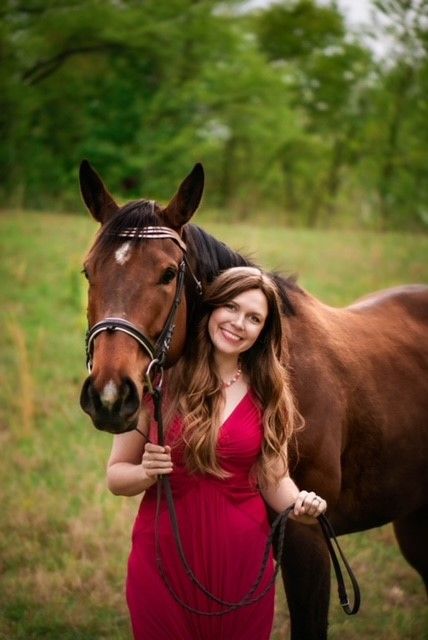Mosquitoes, Horses and 7 Facts You Need to Know


Learn more about the pest we would all love to see less of
As annoying as they are to you, mosquitoes are probably more dangerous to your horse.
“The three big equine diseases transmitted by mosquitoes are West Nile virus (WNV), Eastern equine encephalomyelitis (EEE), and Western equine encephalomyelitis (WEE). Venezuelan equine encephalomyelitis (VEE) isn’t typically a problem, but there have been years with outbreaks in specific areas,” warns Tony Hawkins, DVM, Valley Vet Supply Technical Service Veterinarian.
These diseases can attack and inflame a horse’s nervous system. EEE, WEE and VEE are spread to horses by mosquitoes, which feed on infected birds and rodents that serve as the virus reservoirs. WNV is transmitted by mosquitoes, which feed on infected birds.
Since 1999, more than 25,000 cases of WNV encephalitis have been reported in U.S. horses, according to the American Association of Equine Practitioners (AAEP). Even more, horses represent 96.9% of all reported non-human mammalian cases of WNV disease.

Seven things to remember
We reached out to Dr. Hawkins and Department Head for Entomology and Plant Pathology at Oklahoma State University, and former livestock entomologist, Justin Talley, PhD
It’s important to vaccinate horses before, or at least early in, the mosquito season. Vaccines provide horses with long-lasting immunity. “When horses receive their two initial doses, then after that they have a yearly booster, we will have a good response seven days post vaccination,” said Dr. Hawkins.
“It is important to follow the AAEP core equine disease vaccination protocol and make sure horses are vaccinated yearly against Eastern and Western Equine Encephalomyelitis, West Nile virus, rabies, and tetanus.”
“Mosquitoes are weak fliers, they can’t fly through moving air,” said Dr. Hawkins. “As much moving air as you can design into your barn and your horse’s stalls will be helpful in preventing them from landing and taking a bloodmeal from your horse.
For barn fire prevention, be sure you’re using a livestock fan with an enclosed, protected motor, instead of a box fan. A true livestock fan will also move more air, deterring mosquitoes—and flies, too.”
As far as seasonality goes, Dr. Talley says you’ll generally see more mosquitoes late summer or in the fall.
“Some of the most significant West Nile virus outbreak years have been associated without significant rainfall. Be aware, just because you don’t see water, doesn’t mean there are no breeding areas around,” warns Dr. Talley.
Dr. Talley shared how the Culex mosquito, which is responsible for transmitting core equine diseases such as WNV, can populate in the most unsuspecting places. Even a tiny hole in a tree—with just a bit of water—is enough for the Culex mosquito to repopulate within. Standing, puddling water is not needed.
Check all your sources. “One would think that wet years equal more equine West Nile virus cases; however, the type of mosquitoes transmitting these equine diseases can develop in muddy water or a storm drain. There��’s a lot of water you don’t see,” warned Dr. Talley.
To minimize horses’ exposure, keep them inside the barn under fans during prime mosquito feeding times, which include dusk and dawn, encourages Dr. Hawkins.
Take steps to keep your horses safe and comfortable, as mosquitoes make their presence known.
Tags:Horse Sense

Acreage Life is part of the Catalyst Communications Network publication family.
















